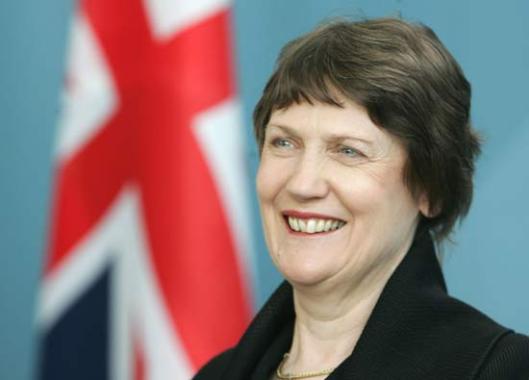Her … backward-looking negativism is driving a wedge between New Zealanders, regardless of their ethnic origin, and it’s time it ceased. –United Party leader, Peter Dunne in 1997
A controversial figure

The recent death of the founder of the Maori Party received plenty, some would say excessive, attention from the Legacy media. Tariana Turia was born in Whanganui in 1944 and having a mix of settler and Maori forebears this made her a citizen of New Zealand and the World. She also had allegiance to a clutch of Maori tribes, and she devoted her life to this side of her background. However, surprisingly she never mastered Te Reo Maori.
Her main claims to fame were as the founder of the Maori Party in 2005 and subsequently as co-leader of the new Party with Pita Sharples.
Looked after by both big parties

After being elected to the Te Tai Hanauru electorate in 1996, Turia subsequently served in both Labour and National governments, and was variously Minister of Community and Voluntary Services, Disability and Whanau Ora, and a Junior Minister for Health, Housing and Social Development. Her support was needed to keep the big parties in power. Having promised to abolish the undemocratic special parliamentary seats for Maori,
National, under leader John Key, abandoned this undertaking in order to have a government with a working majority. Turia was happy to oblige.
Foreshore and Seabed ownership was the catalyst for the new party
After being looked after by Helen Clark’s Labour government and given a well-paid ministerial position, she showed her true colours by voting against the Foreshore and Seabed legislation. The 2004 Act basically declared that the coastline, except for some privately owned parcels, was owned by the Crown, in other words the people of New Zealand regardless of their ethnicity.

The Maori Party was formed because of this issue, and the pragmatic Key duly replaced the Labour act to keep the support of Pita Sharples, Te Ururoa Flavell and Tariana Turia. The new Marine and Coastal Area (Takutai Moana) Act 2011 declared that the foreshore and seabed was a ‘no ownership’ scenario.
Under the law, iwi could apply to the court or negotiate with the Crown for recognition of customary rights (which protect activities such as collecting hāngī stones or launching waka) or customary marine title over a particular area. However, these interests could not prevent existing rights and uses such as fishing, aquaculture and public access. (Te Ara – The Encyclopedia of New Zealand)
Controversial views
Tariana Turia was not popular with non-Maori because of many of her policies and statements. Peter Dunne’s opinion spelled out above was typical. Her interpretations of New Zealand history were colourful but often questionable, such as her claim that the country’s “holocaust” was the treatment of Maori by colonial governments and white settlers.
Distinguished historian Michael King took issue with this. He said in describing the inter-tribal Musket Wars which killed an estimated 40,000 – 50,000 Maori … “if any chapter in New Zealand history has earned the label ‘holocaust’, it is this one.”

She also stated that the 1836 Declaration of Independence (DOI) is an international
declaration that recognizes the independent tribes of ‘Aotearoa’. As historians acknowledge, the DOI was written by early settlers James Busby, Henry Williams and William Colenso, and it was only signed by chiefs in the north of the North Island. However, it did provide a basis for the Te Tiriti o Waitangi which Turia described as being more important than the Ten Commandments.
A great advocate for those with Maori ancestry
At her recent tangi, Tariana Turia was acknowledged as a distinguished proponent of Maori rights, but no mention was made of the realities that the undemocratic special parliamentary seats for Maori, and major party political expediency, allowed her to make her name.
Roger Childs is a writer and freelance journalist. He is a former history and geography teacher, who wrote or co-authored 10 school textbooks. This article was first published HERE


5 comments:
Mark Blumsky (past Wellington mayor and National MP) used to sit next to the Maori Party MPs in Parliament during Turia's time. He could hear their discussions. He later told me that what made those MPs different than all the rest was that they were only concerned with the interests of their own constituents. National, Labour, the Alliance and the Greens would always talk about what was best for NZ. They had different philosophies about that, but the whole country their focus. The Maori Party only spoke about what was best for Maori. Mark Blumsky mentioned that as a reason why we shouldn't have Maori seats on councils.
Interesting opening quote. When she passed, Peter Dunne was the first to appear on NewstalkZB waxing lyrical about her.
Turia's great contribution is that she brought prominently to public attention the underlying self interest of modern maori and the extent of duplicity they willing to adopt to further this. Sadly the message has still not sunk in with many (including I suspect National selection committees). She was so able to con with her smooth English that she presumably thought it not worth while to learn the stone age language just to humour the other already fervent faithfull.
It is interesting to note that this article states that Tariana Turia did not master Te Reo, yet those who did not speak that language, including senior politicians such as the PM, were not allowed to speak at her funeral because they were not fluent in the language.
Extremely disrespectful to those who were not allowed to speak!
Absolutely, it is the overt display of vested interest that should lead to the abolition of Maori seats in both Councils and the Govt! They care nothing for anyone or anything other than themselves.
Post a Comment
Thank you for joining the discussion. Breaking Views welcomes respectful contributions that enrich the debate. Please ensure your comments are not defamatory, derogatory or disruptive. We appreciate your cooperation.